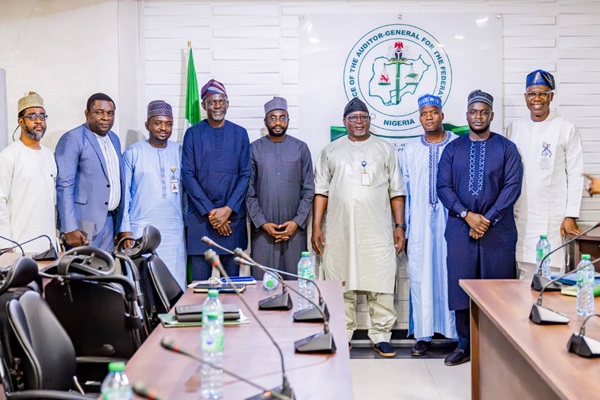
The National Information Technology Development Agency (NITDA) has stepped up its campaign to standardise and sanitise the planning and execution of IT projects across the Federal Public Institutions (FPIs).
The agency made this statement when it presented its reviewed IT Project Clearance Guidance Document to strategic agencies, including the Office of the Accountant General of the Federation (OAGF), the Office of the Auditor General of the Federation (OAuGF) and the Bureau of Public Procurement (BPP).
The new guidance framework is a significant upgrade to the original 2018 Guidelines for Clearance of IT Projects, aimed at aligning government technology investments with the goals of Nigeria’s digital economy, reducing wastage, improving project quality and eliminating avenues for corruption.
Speaking during the series of high-level engagements, NITDA’s director-general, Kashifu Abdullahi, emphasised that the agency cannot operate in isolation if Nigeria is to successfully transition to a fully digital economy in line with the ‘Renewed Hope’ agenda of President Bola Tinubu.
“To achieve a truly digitised public service, we must be intentional and collaborative. The government is one entity and our IT systems must be interoperable and designed to serve citizens efficiently and securely,” the DG stated.
He decried the high failure rate of government IT projects, revealing that 56 percent of them do not deliver expected outcomes due to poor planning, lack of business value focus and the dangerous trend of contractors solely determining project designs and execution.
“The major problem is that most ministries, departments and agencies (MDAs) depend entirely on vendors for everything – from design to implementation and operation. That’s why we end up with solutions that don’t talk to each other and the result is duplication, inefficiency and waste.”
To curb these challenges, NITDA reviewed the original guidelines to incorporate practical mechanisms that ensure better accountability, interoperability and cost-effectiveness. The reviewed document includes a three-stage implementation process comprising solution design, implementation and quality assurance, with each stage requiring certified personnel and licenses before projects are approved.
According to Abdullahi, these steps are not just bureaucratic formalities but are essential in guaranteeing value for money, improving transparency and eliminating the current tendency of using IT projects as a smokescreen for financial misconduct.
“These measures are designed to eliminate corruption, prevent duplication and ensure that government IT initiatives are structured to create meaningful change, fostering efficiency, equity and fairness in public service,” he explained.
At the Bureau of Public Procurement (BPP), the director-general, Dr. Adebowale Adedokun, welcomed the initiative, describing it as long overdue. He lamented that many IT projects presented to the Bureau for approval often lacked standardisation and clear value proposition.
“Sadly, IT has become a convenient way to siphon public funds. Because most project components are intangible, it is easy for unscrupulous officials and contractors to inflate costs or justify questionable expenditures. But with this reviewed guideline, we now have a tool to demand value and accountability,” he said.
Adedokun also stressed the need for NITDA to assist in developing an IT Price Intelligence template to help BPP establish reliable benchmarks for evaluating IT project costs.
“We’re not IT experts, so we rely heavily on NITDA’s technical guidance. If you can provide us with data on fair market pricing for software, licenses and infrastructure, it will significantly reduce manipulation and overpricing,” he said.
Furthermore, he suggested that service-wide procurement of licenses from large tech firms like Microsoft and Oracle could help reduce duplication and cut costs, especially where multiple MDAs require similar services.
To institutionalise this cooperation, both agencies agreed to set up a joint working committee to streamline modalities for implementation and to draft a memorandum of understanding (MoU) to formalise their collaboration.

At the Office of the Auditor General of the Federation, Auditor General Shaakaa Chira lauded NITDA for its forward-thinking approach and pledged to align with the new framework.
“This is a thoughtful and necessary reform. Once the guidelines are in place, we will carry out performance audits to assess compliance and the impact on service delivery,” Chira said.
Similarly, the Acting Accountant General of the Federation, Shamseldeen Ogunjimi expressed support for the revised document and its integration into financial oversight protocols.
“We fully align with NITDA’s goal to streamline and optimise IT project delivery in the public sector. With this guidance, our office can ensure that every naira spent on digital projects aligns with national priorities and brings measurable returns,” Ogunjimi affirmed.
By presenting the Reviewed IT Project Clearance Guidance Document to these critical institutions, NITDA aims to institutionalise a new era of cross-agency synergy, financial prudence and digital innovation.
“We are building a digitised government service—and to do that effectively, we must think beyond individual agency needs and embrace shared services, standardisation and best practices,” the NITDA boss reiterated.
He emphasised that IT is not just about technology but also about people, processes and purpose. For Nigeria to become a leader in digital governance, its public service must be powered by systems that are thoughtfully designed, well-managed and built to scale.
In 2018, NITDA began the clearance process for government IT projects under its enabling Act. Since then, the agency claims to have saved over ₦300 billion in potential waste through its screening process.
“That’s over ₦300 billion that could have been lost to poorly conceived or duplicated IT initiatives. Imagine what more we can achieve with this upgraded guideline and deeper collaboration with institutions that hold the keys to accountability,” Abdullahi concluded.
The reviewed guideline now serves as a strategic tool not just for NITDA but for the entire public sector, with the potential to redefine how Nigeria conceptualises, funds and delivers digital public services in the years ahead.


